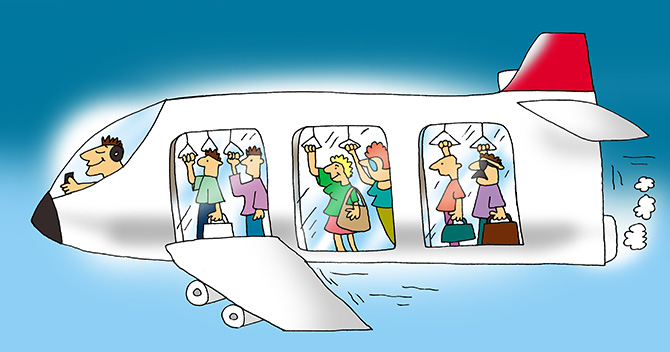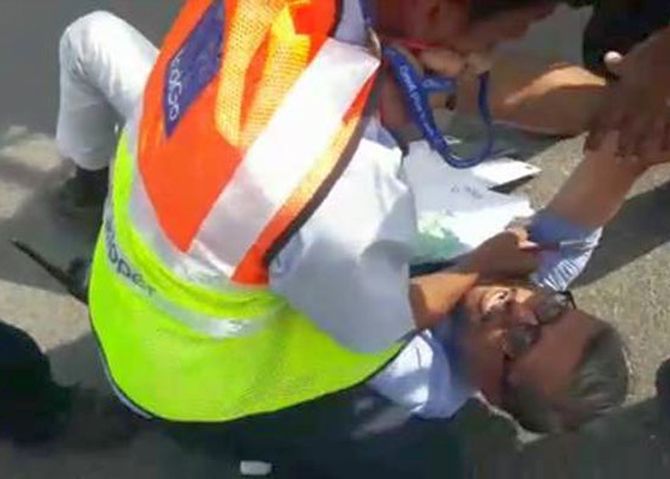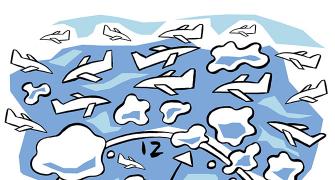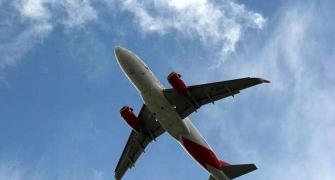Government to ask airlines to educate flyers.
'It will be an exhaustive charter which will tell the passenger about all their rights, like whether they are eligible for a refund when there is a delay in flight, what to do in case of a flight delay and other in-flight etiquette.'
Arindam Majumder reports.
Illustration: Uttam Ghosh/Rediff.com

IMAGE: In 2017, India's domestic air traffic surged 17.4 per cent to cross the 100 million mark.
Government officials say at least a quarter are first-time flyers and they need to be made more aware of their rights protocol while catching a flight.
The government is working on an exhaustive charter of passenger rights and is likely to ask airlines to take steps for educating first-time flyers.
While the number of air passengers have surged in Indian skies, there has been increasing tension resulting in number of unpleasant incidents involving airline staff and flyers.
In 2017, domestic air traffic surged 17.4 per cent to cross the 100 million mark. That's a first for Indian skies, thanks to low fares, an addition of new flights and economic growth.
Government officials say out of these at least a quarter are first-time flyers and they need to be made more aware of their rights protocol while catching a flight.
"It will be an exhaustive charter which will tell the passenger about all their rights, like whether they are eligible for a refund when there is a delay in flight, what to do in case of a flight delay and other in-flight etiquette," says Civil Aviation Secretary Rajiv Nayan Choubey.
Choubey said the government will also ask airlines and airports to take steps so that the charter can be communicated efficiently but has still not finalised on how to do it.
"One process could be through an extra page (in the) directive which will be sent with a ticket, through regular SMS and displaying it prominently in airports. We have suggested this to the stakeholders and will finalise it soon," Choubey adds.
Besides that the government will also ask airlines to properly train their staff in order to guide flyers more efficiently.
"Airlines should also train their staff more efficiently so that they can understand and guide first-time flyers more efficiently," Choubey says.

IMAGE: In a strongly worded report, following the incident when Indigo airline staff allegedly beat up a passenger, a Parliamentary standing committee said that airlines need to become passenger friendly. Photograph: Kind courtesy Facebook
In a strongly worded report released in January, a Parliamentary standing committee said that airlines need to become passenger friendly.
'The crew should be trained to be more polite than saying "please" or "thank you". The passengers expect civilised behaviour from the cabin crew and the ground staff as the salaries to the cabin crew and ground staff are paid from the income earned from the passengers,' the report added.
The committee was taking stock of the situation after several incidents of mistreatment of passengers by airline staff was reported in media including a video where a passenger was seen being manhandled by IndiGo staff.
Aviation consultancy firm CAPA said with a number of rising incidents, airlines are waking up to the need of educating the flyer.
"Airport congestion leading to delays have become a frequent factor, consumer activism against airlines will increase and become a major issue," says Kapil Kaul, CEO, South Asia, of the aviation consultancy firm CAPA.
Air Asia India is working on an etiquette video instructing its passengers on matters such as when to arrive at the airport, how to clear security and when to stand up inside the plane.
'The video is still in production, but we will try to make sure people see it before the flight, whether through our social media channels or Web site,' Amar Abrol, CEO, Air Asia India, said recently.
IndiGo CEO Aditya Ghosh says the airline recognises the need for better communication with flyers.
"Often a pilot cannot fly in weather which may seem alright to a passenger. To them, we have to explain that regulations don't allow one to fly in this visibility," says Ghosh.
"It's a perfect opportunity for the cabin crew or the pilot to educate the passenger why we can't fly."










